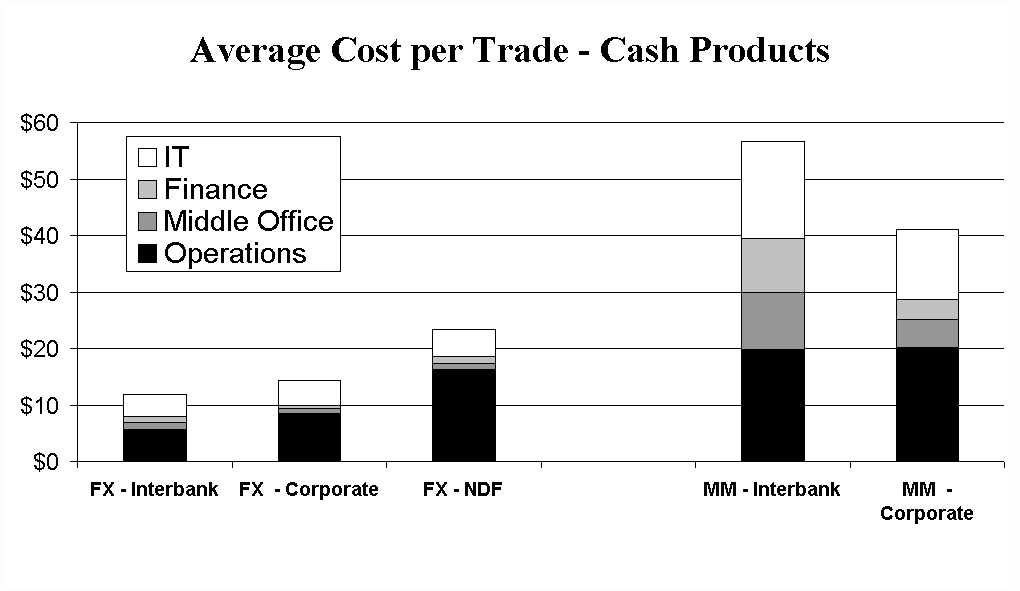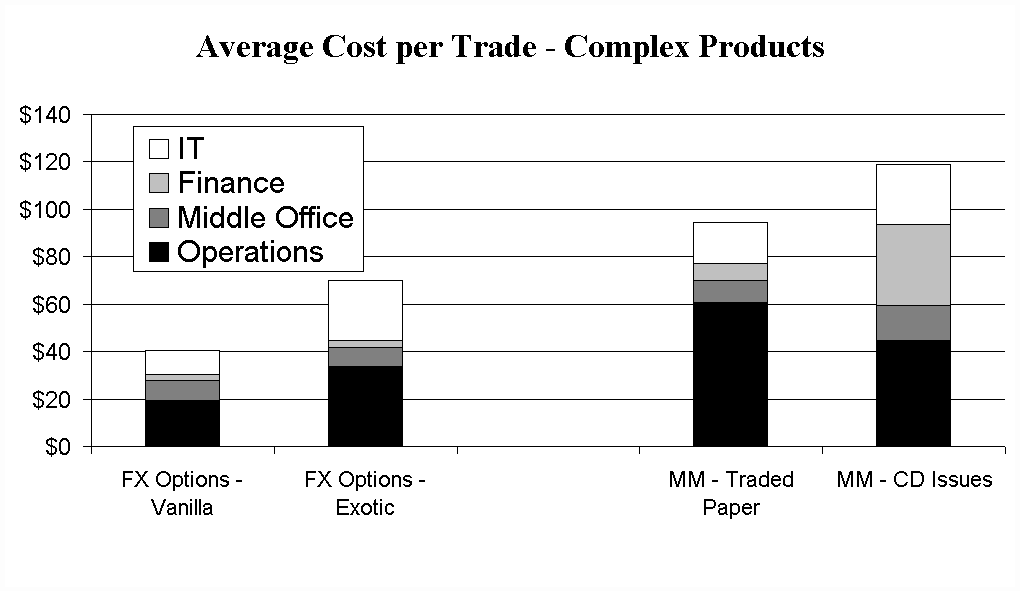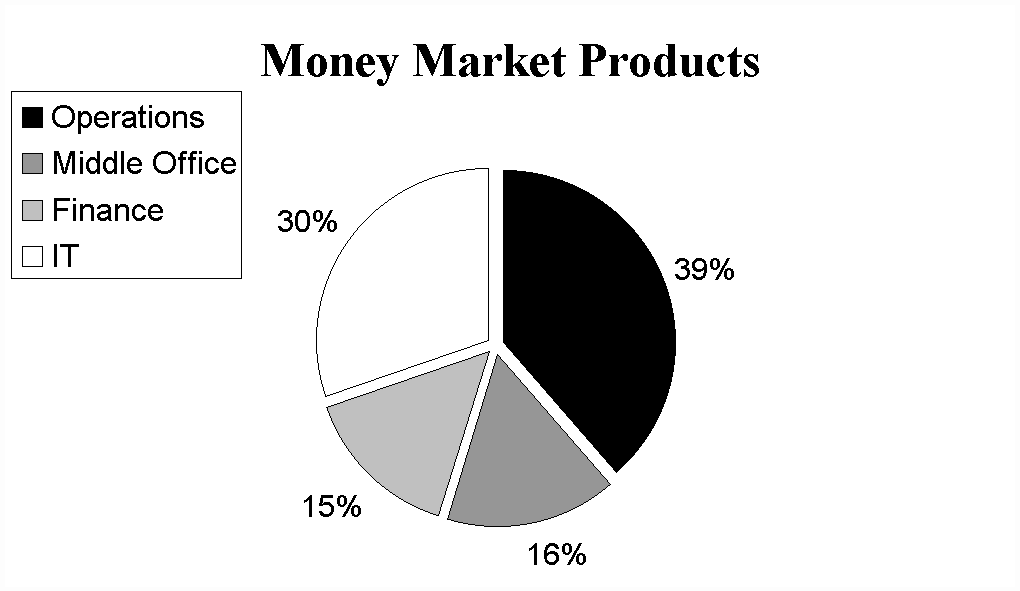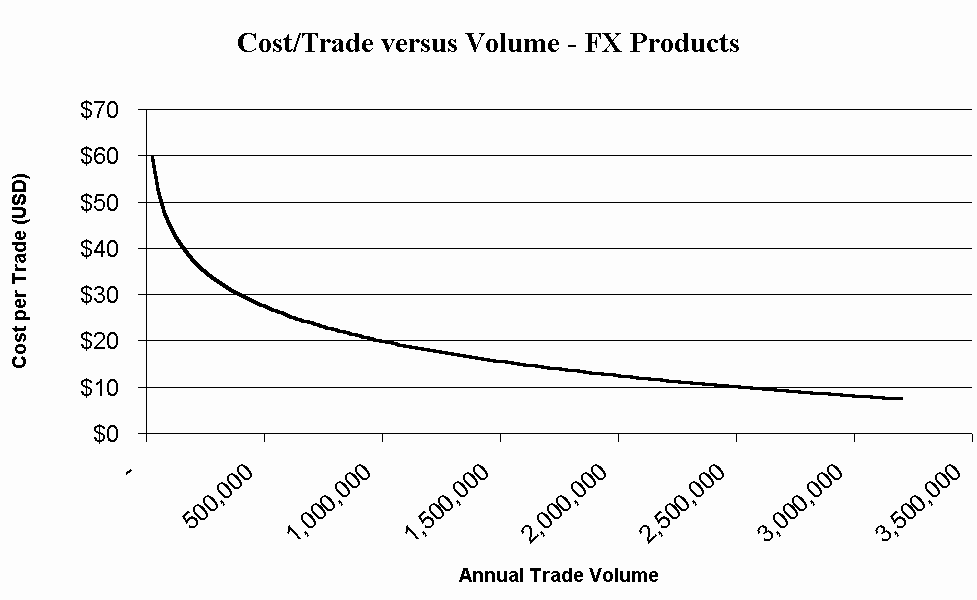FX And Money Markets 2001
Friday, 13 July 2001By Now&ZYen
Have FX processing costs reached the floor?
With Foreign Exchange trading volumes stagnating in the post-euro environment, processing costs remain relatively high for many banks, reports a new survey by Z/Yen, the City-based Risk/Reward Management firm.
With volumes reducing and margins shrinking, banks are looking for ways to reduce costs per trade. However, there are signs that for FX products, all-in processing costs have already reached a floor of about $9 per trade.
Jeremy Smith, a Director at Z/Yen, said, "It is surprising that even the larger banks who process huge volumes have not been able to reduce their costs further. With the advent of CLS, we believe that many banks will looking for external vendors or insourcers as a way to further reduce costs."
The study also shows that some smaller banks have built very efficient infrastructures that can compete with the global players, even though they process much lower volumes. However, all banks have a high proportion of fixed costs, which could drive up the cost per trade drastically if FX volumes decrease.
Overall, the study identifies four major factors driving processing costs for banks:
Location, Location, Location!
Banks who process outside of the main cities can reduce their cost per head by up to 100%.
Technology Matters
In one bank, successful implementation of technology has reduced the cost per trade from $35 to $10.
Additional Volume – Lower Cost per Trade?
With most banks having a high element of fixed costs in their operations, additional volume will bring down the cost per trade significantly.
Centralise or Decentralise?
Many banks have centralised (or are planning to centralise) their operations for FX and Money Market processing. In these cases, additional volume has been processed for negligible additional cost.
A summary of the results of the study is shown on the following pages. For further details, please call Jeremy Smith at Z/Yen on (020) 7562 9562.
Study of FX and Money Market Processing Costs
The study was carried out by Z/Yen and a consortium of 10 major US and European Banks. The scope of the study was to compare and contrast Operations, Middle Office, Finance and IT costs for 31 processing activities over 16 individual financial products (see below):
| FX Products | FX Options | Money Markets Products |
|---|---|---|
|
Interbank (Spot/Forward) Corporate (Spot/Forward) Retail (Spot/Forward) NDFs |
Vanilla Exotic |
Interbank (Loans/Deposits) Corporate (Loans/Deposits) Retail (Deposits)* * Traded Paper * CD Issues |
Each bank provided detailed cost, volume and headcount data for full-year 2000. Over 10,000 data points were gathered, analysed and consolidated into a set of comparative benchmarks.
Summary of Findings
- Interbank FX is the cheapest Treasury Product to process - Money Market trades are more expensive – possibly due to the much smaller volumes processed and the need for higher effort in middle offices and finance groups.

- Costs for Derivative and Complex Products are much higher – Despite high spending on IT for Derivatives, processing costs are many times those of cash products. Additionally products such as Traded Paper and CD Issues are still manual at some banks.

- Back-Office Operations are the main element of cost for both FX and Money Market Products. For Money Markets, Operations is a much lower proportion with additional effort in Middle Office and Finance. For Currency Options, Middle Office Costs are much higher than for the cash products.

- For each Treasury Product, there is a minimum cost. Even though costs do reduce with higher volume, there is a minimum cost for any product. This minimum cost is in the region of $10 per trade for FX and $20 for Money Markets.

- Costs per Trade varies widely between banks, therefore, there is plenty of room to reduce costs further across the market. While many of the participants had broadly similar product profiles, costs ranged widely. In some (but not all cases), smaller banks had the highest cost per trade, while those that had centralised their operations or processed in a less expensive location tended to be cheaper.
- Fixed costs are high – Over 50% of costs are either fixed (IT) or portfolio-driven (Middle Office and Finance). This is a potential problem for banks if volumes decline as their cost per trade will rise.
Forthcoming Studies
Z/Yen is now seeking additional participants for some forthcoming studies:
- Equity and Debt – 2001
- Clearance and Settlement Fees – Global Markets – 2001
- Brokerage Fees – 2001
- IT Costs in Financial Services – 2001
For further details, please call Jeremy Smith at Z/Yen on (020) 7562 9562.
About Z/Yen
Z/Yen's mission is to be the foremost risk/reward management firm. Risk/reward management is the application of risk analysis and return incentives to strategic, systems, human and organisational problems in order to improve performance. Z/Yen believes that the intelligent management of risk is the basis of significant reward. By recognising, understanding and managing risks, more risk can be assumed and performance increased. Z/Yen applies risk/reward management in the public, private and not-for-profit sectors in areas as diverse as finance, information technology, human resources, research & development, environment, quality, sales & marketing.Z/Yen's slogan is "zest for enlightenment", embodied in five distinguishing principles:
- Investing in clients;
- Investing in partners;
- Improving ourselves;
- Retaining and developing innovation and humour;
- Sharing the rewards.
Z/Yen has developed a risk/reward methodology based on analytical techniques from a number of fields which manage risk. The methodology consists of a strategic framework, supporting software, procedures, case studies and report formats. The methodology has been applied to strategic planning, financial planning, information technology planning, marketing plans, fraud investigations, reserves analysis, systems reviews, cost-effectiveness studies and human resource planning. Z/Yen's strategy is based on three approaches:
- Enhancement of the risk/reward methodology;
- Management consultancy projects to identify ventures;
- Development of a partner network.
Z/Yen organises its work in projects with a specific proposal for each phase and strong project management. Z/Yen is committed to sharing the risks and benefits of work with clients, often in the form of performance-related fees, and measuring work in quantitative or qualitative terms. Z/Yen has access to venture capital and, where appropriate, can provide a combination of financial and advisory services in exchange for equity or other stakes.
Z/Yen applies its techniques with confidence in a variety of areas, but has stronger experience in technology, insurance, banking, media, health, distribution, charities and business to business services. Z/Yen has three partners, over ten staff and more than 50 associates.Staff share significantly in the benefits of success and Z/Yen seeks to develop a supportive environment in which professionals from a variety of disciplines can flourish.
Financial Services
Financial Services is an industry where risk and reward are clearly present in day-to-day decisions.As the leading risk/reward management firm, Z/Yen is ideally suited to helping institutions make decisions in the areas of strategy, systems, people and organisation. Z/Yen’s proprietary risk/reward methodology is not only culturally suited to the industry, but unifies strategies from the boardroom to the trading floor, from headquarters to the counter/ATM, from central office to the customer call centre.
Z/Yen’s work spans investment banking, investment management, retail banking, building societies, credit card companies, central financial exchanges, financial information and financial system providers, including ‘front’, ‘back’, ‘middle’, ‘sell-side’ or ‘buy-side’. The type of work ranges from strategic planning, through information systems planning, transaction costing (benchmarking), market segmentation, new electronic market simulations, queuing models for counters, correspondent banking restructuring, computer systems installation, management information systems design, new product/Internet product design and outsourcing.
In the last year, Z/Yen has undertaken the following client assignments in the Financial Services arena:
- Development of marketing documentation for a European software house;
- Commercialisation strategy for an internal consulting group of a major bank;
- Benchmarking studies for the Equity and Debt Markets which compared costs per trade for 10 major banks (2000 and 2001 studies);
- Market survey of “Buy-Side Customer Needs”;
- Benchmarking study for the FX and Money Markets;
- Development of a Stock Exchange Trading Game for a "DotCom";
- Benchmarking study for European Clearance and Settlement Fees;
- Market survey of the OTC Derivatives Market.
Z/Yen participates actively in organisations that are attempting to expand the boundaries of financial research, for example, the Centre for the Study of Financial Innovation.Z/Yen was the founder and concept developer of a £1.9 million joint research initiative, The Financial Laboratory, which won a 1996 DTI Foresight Challenge award.
Institutions cannot afford to stand still in a competitive market. With the advent of T+1, new entrants to the industry and continuing pressures on staff, a robust risk/reward response is vital. Z/Yen is the natural partner for institutions seeking positive changes in response to their environment.
For further information, please call Jeremy Smith at Z/Yen on (020) 7562 9562.